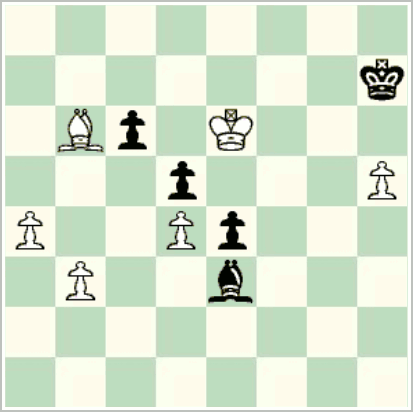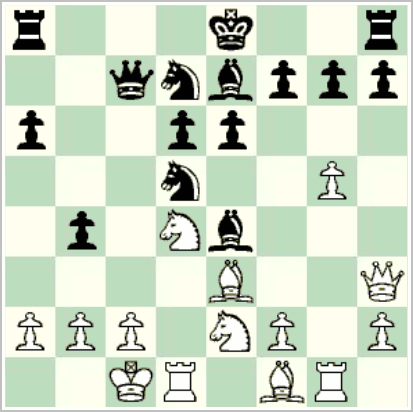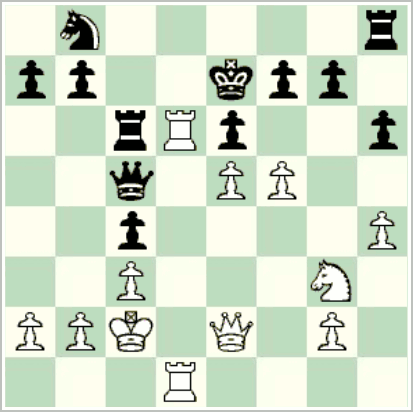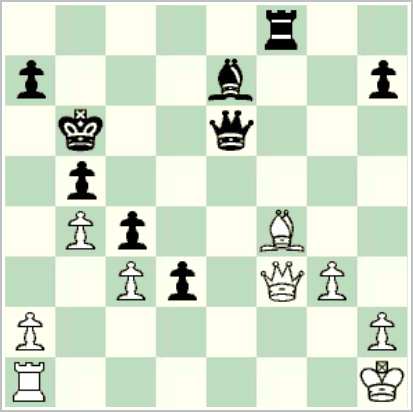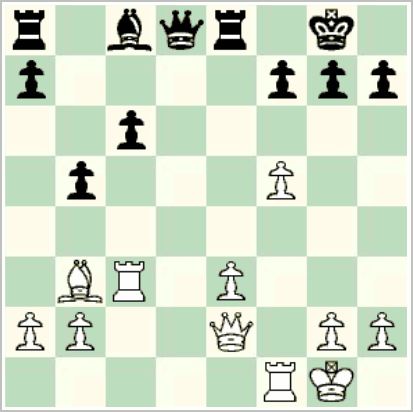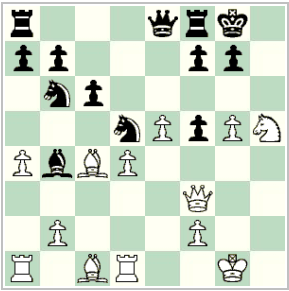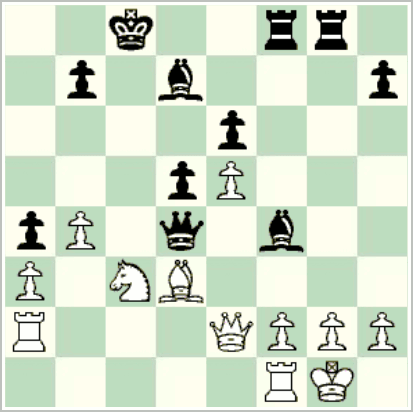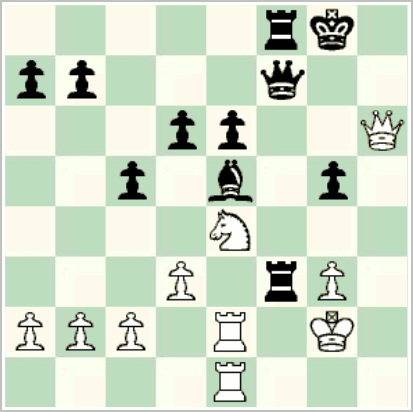In his post on the high quality photograph of Michael Littleton playing at the World Championship Zonal at The Hague in 1966, Sean pointed out the much improved result Littleton achieved in the following World Championship qualifying process at the 1969 Zonal at Praia da Rocha in the Algarve.
That improvement was noticed at the time by the Englishman William Hartston, one of Littleton’s rivals at the 1969 Zonal:
Littleton’s performance was clearly better than previous Irish results in zonals. He seems a much improved player in the last few years, and is probably the only Irish player at present able to hold his own in such an event. [The West European Zonal Tournament by W.R. Hartston, British Chess Magazine, Volume LXXXIX, 1969, pages 360-362]
Paul Cassidy had begun a chess column in the Irish Independent in November 1969 and in only its second appearance he provided this profile of Littleton.
Michael Littleton is one of our leading younger players. He took up chess in 1958, and made such rapid progress that he won the Leinster Intermediate Championship that year and the Leinster Senior Championship in 1959. He again won the Senior Championship in 1963 and the Irish Championship in 1962 and 1965. Littleton, who has represented Ireland in three team championships, has had consistently good results against strong overseas players. He has beaten Grandmaster Yanofsky (Canada) and Master Brinck-Claussen (Denmark) in team tournaments. His results against the leading players in the recent Zonal Tournament were excellent [our emphasis]. Littleton is strong in all phases of the game. His knowledge of opening theory is profound, his middle game technique is outstanding, and he is a very strong endgame player. He is, however, inclined to get into time trouble and has spoilt previous good play because of this on a number of occasions. Littleton has built on his natural talent for the game by hard work and enthusiasm. For the past number of years he has consistently been among the top three players in the country.
Before detailing some of Littleton’s play in the 1969 Zonal, it should be pointed out that Littleton’s performance was performed in the face of far from ideal conditions. Hartston had this to say in his report in the British Chess Magazine:
[S]ome mention should be made of the poor standard of organisation of the tournament. Admittedly the Portuguese only agreed to stage the zonal at very short notice, but more attention should have been given to the playing conditions, especially the standards of lighting and extraneous noise in the playing rooms. Also much ill-feeling was created by segregating the players into separate hotels: a first class hotel for the strong players and friends of the organisers, and a second-class hotel for the others! [Hartston, ibid.]
David Levy, the Scottish representative at the Zonal (and who was awarded the International Master title for achieving a two-thirds score at it) was even more scathing. Levy considered that his hotel, which presumably was the one Littleton stayed at, was “distinctly flattered by its designation “second class”. Enteritis continually threatened. It was Hartston who won the competition for finding the most flies in his meal.” [European Zonal No. 1, Praia da Rocha, Portugal, October 20-November 16 by D.N.L. Levy, Chess, Volume 35, pages 86-87]
Littleton started the event strongly, with a hard-fought draw against Levy. He continued that good beginning in the next round drawing a roller-coaster of a game against Yugoslav IM Dragoljub Minic, one of the eventual three qualifiers, winning the event on tie-break from the other two, GMs Svetozar Gligoric and Miroslav Filip. It is one of only four games Hartston selected for inclusion in his British Chess Magazine article.
Michael Littleton – Dragoljub Minic
Praia da Rocha Zonal, Round 2
1.d4 Nf6 2.c4 g6 3.Nc3 Bg7 4.e4 d6 5.f4 c5 6.d5 O-O 7.Bd3 e6 8.Nge2 exd5
9.exd5 Nh5 10.O-O f5 11.Qc2 Na6 12.a3 Bd7 13.Bd2 Re8 14.Rae1 Kh8
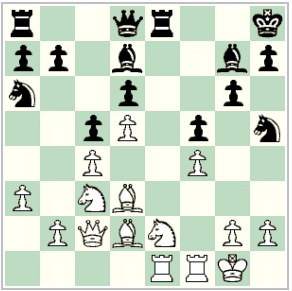
Position after Blacks’s 14th move
With all his pieces developed, Littleton now decides to launch a kingside attack.
15.g4 fxg4
Stockfish 12 here suggests 16.Ne4 would be a better follow-up but it is quite likely that Littleton already had in mind the Bishop sacrifice on move 18, .
16.f5 Qh4 17.f6 Nxf6 18.Bxg6 hxg6 19.Nf4 Kg8 20.Nxg6 Qh5 21.Ne7+ Kf7 22.Nf5 Bxf5 23.Rxf5 Rxe1+ 24.Bxe1 Qg6 25.Ne4 Kg8 26.Nxd6 Nd7 27.Bg3 Rf8 28.Rxf8+ Nxf8 29.Qxg6 Nxg6
Minic has survived Littleton’s enterprising tactics but despite still being a piece down, according to Stockfish the Irishman has good chances of drawing the endgame.
30.b3 Bb2 31.Nb5 Kf7 32.Kf2 Kf6 33.Ke3 Be5 34.Nxa7 Bxg3 35.hxg3
With the exchange of Bishops, Minic’s chances of victory have improved.
Ke5 36.Nb5 Nf8 37.Nc3 Nd7 38.Ne2 Nf6 39.Nf4
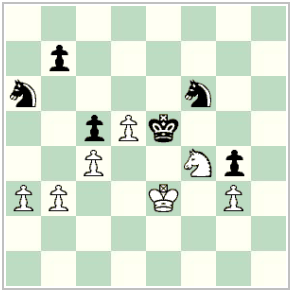
Position after White’s 39th move
39…Nc7
A significant mistake by Minic. He should have played 39…Kf5.
40.Nd3+ Kd6 41.Kf4
The game was probably adjourned here after a time-control at move 40. Littleton is going to win Black’s g-pawn and the game is now evenly poised. The game was agreed drawn without being resumed.
1/2-1/2
[Play through the game]
Littleton’s win in the following game was featured in Cassidy’s chess column. The game also had the honour of appearing in Chess Informant, Volume 8 with annotations by Minic.
Rafael Saborido Carne – Michael Littleton
Praia da Rocha Zonal, Round 5
1.d4 Nf6 2.c4 g6 3.Nc3 Bg7 4.e4 d6 5.f3 O-O 6.Be3 Nc6 7.Qd2 a6 8.O-O-O Bd7
9.Bh6 Bxh6
( ! according to Minic)
10.Qxh6 e5 11.d5 Nd4 12.Nge2 Nxe2+ 13.Bxe2 b5 14.g4 Qe7 15.h4 c6 16.h5 b4 17.dxc6 bxc3 18.cxd7 d5
(A very good move, giving Littleton a winning advantage, according to Minic.)
19.hxg6 fxg6 20.Kb1 Rab8 21.b3 Qa3
Black’s Queen penetrates along the a3-f8 diagonal opened up for it by Littleton’s 18th move.
22.Kc2
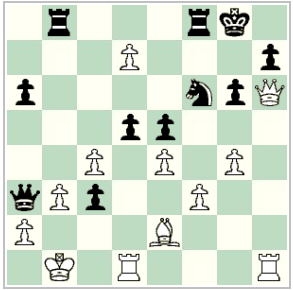
Position after Black’s 21st move
“If White plays the intended 22.Qc1 Black wins by 22…Rxb3+ 23.axb3 Qxb3+ 24.Ka1 Qa4+ 25.Kb1 Rb8+.” – Cassidy.
22…Qxa2+ 23.Kd3 Qxb3 24.Ke3 Qb6+ 25.Kd3 dxc4+ 26.Kxc4 Qb3+ 0-1
[Play through the game]
In the next round Littleton faced the Czech GM Miroslav Filip, who had played in two Candidates tournaments (two rungs further up the ladder to World Championship glory and the final one before the World Championship Match) at Amsterdam in 1956 and Curaçao in 1962. Littleton does not appear to have been overawed by his opponent’s pedigree.
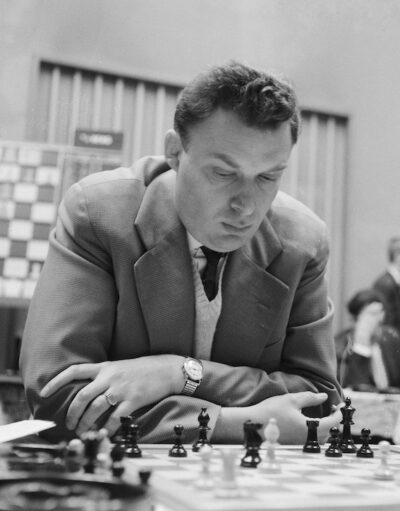
Miroslav Filip at the 1966 Hoogovens Tournament (Dutch National Archive – Creative Commons Universal Public Domain)
Michael Littleton – Miroslav Filip
Praia da Rocha Zonal, Round 6
“Littleton’s enterprising play fails to reap any dividends.” [Chess, Volume 35, page 123]
1.e4 c6 2.c4 d5 3.exd5 cxd5 4.cxd5 Nf6 5.Qa4+ Nbd7 6.Nc3 g6
In this position, Lars Schandorff, in Grandmaster Repertoire 7: The Caro-Kann, (Quality Chess, 2010) at page 186, says that “White has tried a lot of things here, ranging from the sophisticated to the bizarre.” White’s next move he puts in the latter category but he does also give it the !? symbol, indicating it is a move worthy of consideration.
7.h4 Bg7
7…h5?! 8.Nh3 and White has the upper hand, according to Minic in Chess Informant, Volume 8.
8.h5 Nxh5 9.g4 Nf6 10.g5
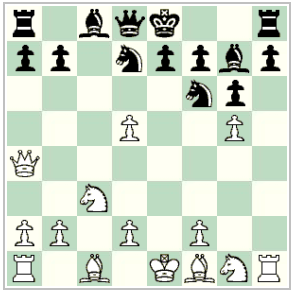
Position after White’s 10th move
10…Ng8
! according to Minic, who says that after the alternative 10…Nh5, White has 11.Be2 with the upper hand. However if the idea is to capture the Knight on h5 and expose the h-file, Schandorff gives “[11…] 0-0 Not fearing ghosts. 12.Bxh5 gxh5 13.Rxh5 Qb6 Black has good compensation.”
11.d4 Kf8 12.Be3 Nb6 13.Qb3 Bf5
This opening variation appears in section B10 of the groundbreaking five-volume Encyclopaedia of chess openings. Filip had responsibility for the B10 section [Volume B (Batsford / Chess Informant, 1975), first edition] and unsurprisingly he refers there to this game. In this position his opinion was that Black stands slightly better.
14.Bh3 Qd7 15.Bxf5 Qxf5 16.Rh3 Qd3 17.Nge2 Qc4 18.Rf3 Qxb3 19.axb3 h6 20.Nf4 Ke8 21.Nb5 hxg5 22.Nc7+ Kd7 23.Nxa8 Rh1+ 24.Ke2 Rxa1 25.Nxb6+ axb6 26.Nd3 f6
Minic indicates that Black has a decisive advantage here. Stockfish 12 concurs.
27.Bd2 Rh1
However, Minic failed to notice that Filip’s very next move gives away a lot of his advantage. He had to play 27…Nh6 to prevent the White Rook penetrating to e6, as now happens in the game. If White tries the idea in this line, starting with 28.Re3, then Black has the riposte 28…Nf5 and if now 29.Re6 then 29…Nxd4 forking King and Rook.
28.Re3 Nh6 29.Re6 Nf5 30.Rxb6 Nxd4+ 31.Ke3 f5 32.Bc3 Rh3+ 33.Kd2 g4
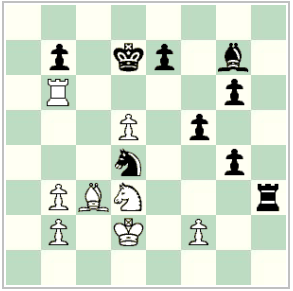
Position after Black’s 33rd move
34.Rxg6
The losing move. Instead 34.Bxd4 Bxd4 35.Rxg6 would seem to give White chances of hanging on for a draw.
34…Bh6+ 35.f4 gxf3+ 36.Rxh6 Nxb3+ 37.Kc2 Na1+ 38.Kb1 Rxh6 39.Kxa1 Kd6 40.Kb1 Kxd5 41.Kc1 Rh2 42.Be1 Kd4 0-1
[Play through the game]
Despite losing this game Littleton had made a very encouraging start to the Zonal with 2.5 points from 6 games. He continued to hold his own for the rest of the tournament and finished tied 11th with 6.5 points out of 17.
